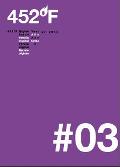Viviendo en un simulacro : cómo la televisión y el supermercado redefinen la realidad en White Noise de Don Delillo
Article Sidebar

Main Article Content
Ahmad Ghashmari
Este artículo plantea el impacto de la simulación, el hiperrealismo y el consumismo en la novela de Don DeLillo White Noise. Se plantea cómo la novela presenta la tecnología y los medios de comunicación masivos como un imperio de signos y códigos que borran o destruyen el significado. La televisión, los boletines radiofónicos y chismes, y los dispositivos de imagen médicos están imbricados con muchos aspectos de la vida de la personas en esta última cultura capitalista. Además, el artículo arrojará cierta luz sobre la cuestión de la hiperrealidad generada por las simulaciones; se verá cómo este nuevo tipo de realidad se convierte en algo más real que la propia realidad. A continuación, se estudiará la influencia de los supermercados y el nacimiento de la cultura de consumo. Se planteará en qué medida la producción y el consumo han adquirido un nuevo y distinto significado en esta nueva sociedad «superficial», y cómo esto moldea la comprensión e interacción de la gente con la realidad.
Article Details
How to Cite
Ghashmari, Ahmad. “Viviendo en un simulacro : cómo la televisión y el supermercado redefinen la realidad en White Noise de Don Delillo”. 452ºF: revista de teoría de la literatura y literatura comparada, no. 3, pp. 171-85, https://raco.cat/index.php/452F/article/view/208105.
Rights
Copyright
All contents published in the journal are protected under a Creative Commons BY-NC-ND license. This corresponds to legislation within Spain, and does not allow commercial use of the texts. It is not possible to modify the contents either.
General information.
Comparative Literature magazine 452ºF [ISSN 2013-3294] is a publishing project coordinated by Asociación Cultural 452ºF, and developed by its Editorial board.
Access to the Contents and Copyright.
All contents published in the journal are protected under a Creative Commons BY-NC-ND license. This corresponds to legislation within Spain, and does not allow commercial use of the texts. It is not possible to modify the contents either.
Every person has free access to the contents of the journal as long as they understand and assume that no profit is to be made on other people’s work.
In all cases, the original source name of the online journal and the article must be mentioned when used for any purposes.
Basic Conditions of all Call for Papers.
- 1. The author accepts that sending the paper:
- a. Does not guarantee the publication of it.
- b. Is done in accordance to the style-sheet of the magazine and the requirements of the specific call for papers.
- c. Implies the non-exclusive transferring of the first publication rights of the paper, as long as it is selected to be published in the journal, to theAsociación Cultural 452ºF, under a Creative Commons BY-NC-ND license.
- 2. The journal 452ºF, in due respect to moral rights of a copyright, guarantees that:
- a. All papers will be evaluated according to the procedure already mentioned.
- b. All authors will receive either a positive or negative answer to their sending a paper for publication.
- c. All papers will be published unabridged. The journal might make changes in the typographical disposition according to the needs.
- d. All papers will be published under a Creative Commons BY-NC-ND license.
Most read articles by the same author(s)
- Ahmad Ghashmari, Living in a simulacrum : how TV and the supermarket redefines reality in Don Delillo's White Noise , 452ºF: revista de teoría de la literatura y literatura comparada: No. 3 (2010)
- Ahmad Ghashmari, Bizitzaren simulakroan : telebistak eta supermerkatuak errealitatea nola eraldatzen duten Don Delilloren White Noisen , 452ºF: revista de teoría de la literatura y literatura comparada: No. 3 (2010)
- Ahmad Ghashmari, Vivint en un simulacre : com la televisió i el supermercat redefineixen la realitat a White Noise de Don Delillo , 452ºF: revista de teoría de la literatura y literatura comparada: No. 3 (2010)